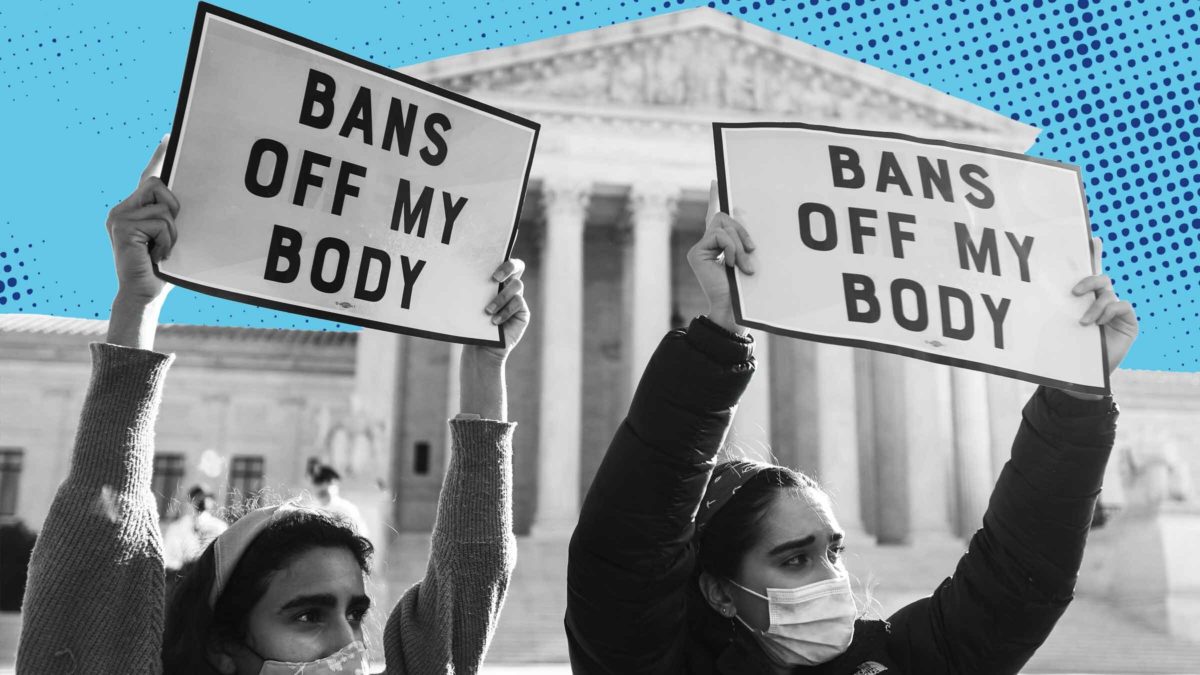As expected, yesterday’s Supreme Court oral arguments in the Texas abortion cases were light on actual discussions of abortion, and heavy on the technical vagaries of who can sue whom, exactly, and where, and when. Although it appears that some conservatives on the Court may be inclined to let at least one lawsuit proceed—the complaint filed by abortion providers against judges and clerks in the state—such a victory would likely prove equal parts hollow and fleeting.
Before the Court on Monday were a pair of cases about Texas SB8, a six-week abortion ban with a twist: a private enforcement mechanism that allows anyone, anywhere, to sue anyone who aids or abets an abortion. But the justices are not directly considering the constitutionality of this law, which obviously flouts the guarantees of Roe v. Wade and Planned Parenthood v. Casey. Instead, it’s a fight over if and how litigation to block the law, which has already taken effect, can proceed. In one case, the Biden administration has stepped in to sue the state of Texas; in the other, abortion providers sued the state court judges and clerks in an effort to bar them from accepting vigilante cases in their courtrooms.
Of the members of the Court’s conservative wing, Justices Brett Kavanaugh and Amy Coney Barrett seemed most inclined to let that second case—Whole Woman’s Health v. Jackson—proceed. Like Justice Elena Kagan, Kavanaugh seemed dubious of Texas lawmakers’ exploitation of a loophole in drafting SB8: that by barring state officials from enforcing the law, they could preempt lawsuits against those officials to block the law’s enforcement. “The fact that after all these many years, some geniuses came up with a way to evade…the broader principle that states are not to nullify federal constitutional rights, and to say, ‘Oh we’ve never seen this before, so we can’t do anything about it’?” an incredulous Kagan said. “I guess I just don’t understand that argument.”
Barrett, meanwhile, expressed concern that the law may not fully allow those sued under it to raise a constitutional defense. A constitutional defense typically allows a defendant—in this case, someone sued because they allegedly aided or abetted an abortion—to assert that a law is unconstitutional as applied to everyone. However, as Barrett pointed out, the text of SB8 specifically bars defendants from raising such a defense. Under the law, no one can argue that ruling against a defendant would impose an illegal “undue burden”—the standard in Casey—on someone seeking abortion care. A right you can’t vindicate in court, as the old saying goes, is no right at all.
Even if SB8 eventually goes down, another abortion case on the docket could render this result a historical footnote.
Kavanaugh and Barrett are probably also spooked by the notion that if Texas can create a private right of enforcement to penalize people for exercising their right to obtain abortions, other states could attack other rights of which conservatives are more fond—say, to gun possession, or free speech, or religious liberty. Kavanaugh seemed particularly troubled by this possibility, worrying about the implications of a law that made “everyone who sells an AR-15 liable for a million dollars to any citizen.” Chief Justice John Roberts, too, was incredulous at the suggestion that the threat of multiple million-dollar bounties wouldn’t functionally end the exercise of a constitutional right. “That takes a lot of fortitude—to undertake the prohibited conduct in that case,” he said.
If some combination of Roberts, Barrett, and Kavanaugh join with the liberals to let the lawsuit proceed, that wouldn’t be much of a victory for either the providers who brought the lawsuit or people in Texas who need abortion care. Such a ruling would not strike down SB8; instead, it would merely allow litigation in the lower courts to proceed. And SB8 specifies that even if a court temporarily declares the law invalid, providers remain liable for any abortion they aid, abet, or assist in procuring if that court gets overruled on appeal. This perpetual liminal liability looms over providers and everyone else in Texas, making it risky for clinics to resume performing post-six-week abortions until the case, at some undefined point in the future, is finally resolved.
Besides, this fear of ruinous lawsuits has already had its intended effect: Abortions in the state fell by half in September, the month the law took effect. Researchers at the University of Texas found that the SB8-related drop is even greater than the 38 percent decrease during the early months of the COVID-19 pandemic, when Texas Gov. Greg Abbott issued an executive order that barred nearly all abortions for roughly a month. Some clinics in the state, wary of jeopardizing access to the non-abortion health care services they provide, stopped providing abortions altogether.
In her closing, newly-confirmed Solicitor General Elizabeth Prelogar highlighted the impossibility of the situation that Republican lawmakers have forced on clinics in the state. “What the State of Texas [is] saying is that clinics should just violate the law. They should go out there, they should go about business as usual, and subject themselves to the risk that they will be forced to close their doors.”
What Prelogar is getting at is exactly what the Court’s conservatives largely glossed over during oral argument: Texas already won. The cynical design of SB8 has gutted access to abortion care. Even if SB8 eventually goes down, another abortion case on the docket could render this result a historical footnote: A challenge to Mississippi’s 15-week pre-viability ban, Dobbs v. Jackson Women’s Health Organization, is set for oral argument in less than a month. If the Court overrules Roe and Casey, parsing the intricacies of SB8 won’t matter anymore, because Texas can just ban abortion altogether—no vigilante enforcement required. Given at least a dozen states have previously passed pre-viability bans only to be stymied by federal courts, other Republican-controlled state legislatures would almost certainly quickly follow suit.
Whatever the ultimate fate of Texas’s bounty law, the right to abortion care itself is hanging by a thread. Anti-choice forces have marshaled to ensure that they have a very friendly Court. Abortion access, in Texas and everywhere else, will be in danger for as long as that is the case.

